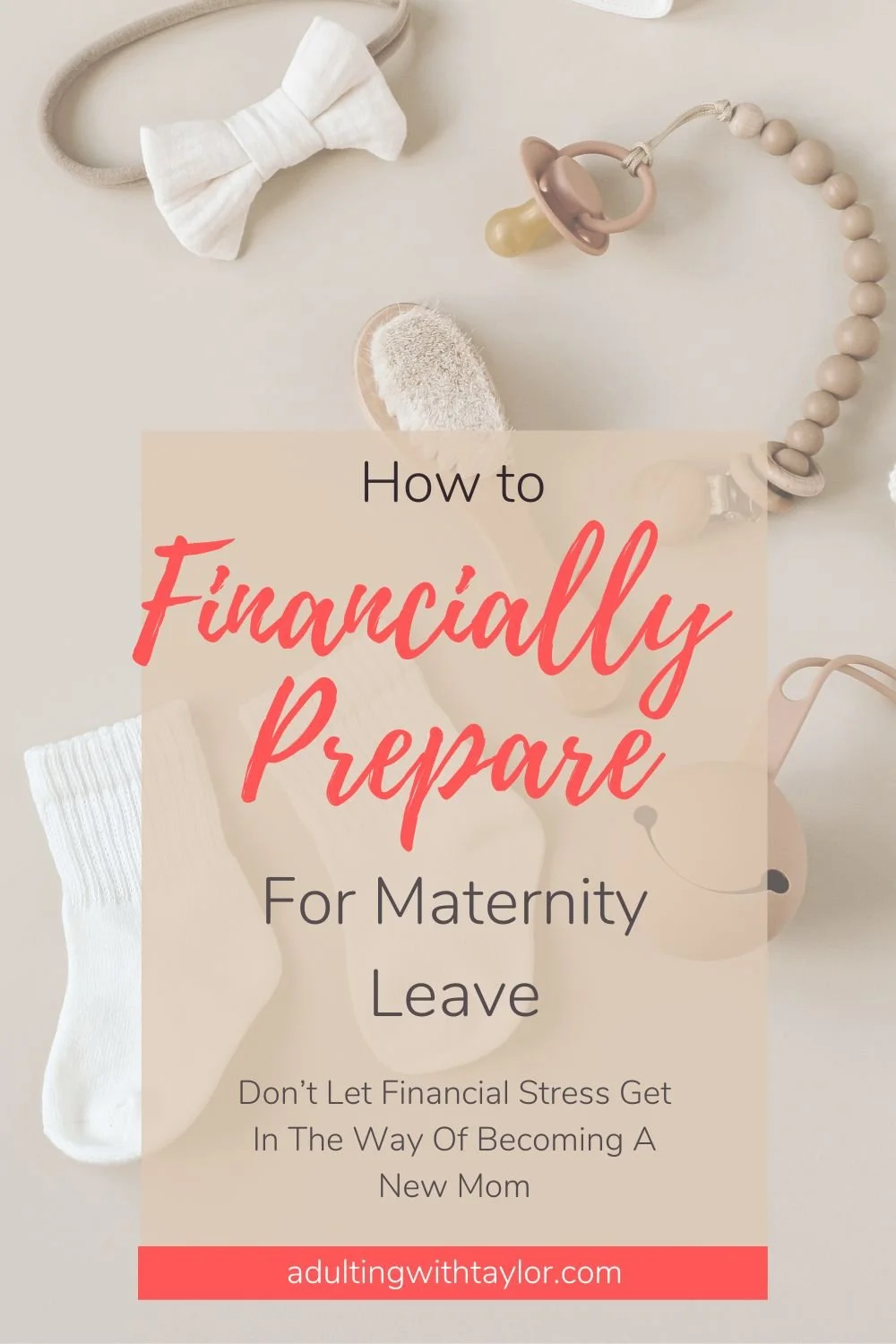Financially Preparing For Maternity Leave
Get your money right now so you can fully enjoy baby and thrive financially
Oh maternity leave. A much anticipated break from work, probably one of the longest most of us will ever take, wrapped together with the excitement of welcoming a new baby into our lives.
But there may be one aspect you’re either forgetting or avoiding thinking of: how are we going to afford to have me take this much time off of work?
There is no one-size-fits-all answer for anyone living in the United States, where most of the population does not receive Paid Family Medical Leave. This is something you’re going to have to think about and research to really figure out for yourself.
This article is here to help you start thinking about what taking a maternity leave with financially mean for your household, create a plan for you to be able to afford to take time off, and help you save money now!
Know your benefits
Paid Family and Medical Leave Act
The United States does not have a standard Paid Family and Medical Leave benefit for maternity and paternity leave as most other Western developed countries do. However, some states have made major strides in the past 5 years to offer a paid maternity and paternity leave benefit to their residents. Do you live in one of these states? As of October 2023 this list includes California, Colorado, Connecticut, Delaware, Massachusetts, Maryland, New Jersey, New York, Oregon, Rhode Island, and Washington—and the District of Columbia.
If you do qualify for a state funded PFML you’re going to need to do some googling on what the benefits actually are (how much you can expect to be paid and for how long). Look for information provided directly from your state’s .gov website. Honestly, it may be a little confusing (I’ve been there), so you may need to call to get a clear explanation of benefits.
For me, I live in Massachusetts and was able to benefit from PFML with my first and pretty soon my second birth. Here is what I was looking at for benefits: 18 weeks paid leave (6 weeks on Medical Leave, 12 weeks of Bonding Time). If you have a c-section you are able to take 8 weeks of medical leave. You are paid 80% of your weekly wage, up to a certain dollar amount (as of 2023 it is $1,129.82). So say your weekly wage is $1,700/week, the maximum you will receive is $1,129.82. And that is pre-taxed!!
Still almost a year and a half after I have taken my first maternity leave, on the Massachusetts website they still have a statement that says “As of 2023, the IRS has not yet made a ruling on whether your PFML benefits are considered “taxable income.” After speaking with our accountant before my first maternity leave, she suggested I select to have taxes paid on my weekly maternity leave benefit - so that turned my weekly benefit into about $800/week, which is a significant reduction. Speak to a tax professional on whether they think you should have taxes taken out of you PFML benefit!
Short Term Disability Insurance
Check with your employer to see if they offer and if you are currently paying for Short Term Disability insurance. It is pretty standard for pregnancy/maternity benefits to be included in your typical Short Term Disability plan.
The standard benefit is usually 6 weeks for vaginal birth, 8 weeks for a C-section, receiving 50-70% of your weekly wage.
Be sure to speak with HR at your job about filing for maternity leave benefits! At my last employer I had to go through the Short Term Disability Insurance company we had to get my Medical and Bonding time benefits that were provided through my state. They acted like a broker on my behalf. Being at a new employer this time around I’m not sure that it will be the same case, but definitely will be having this conversation with my HR department.
Also just wanted to point out that for me, I could not file for benefits until a month before my due date, and a representative would not speak to me until two weeks before my due date. So I honestly really couldn’t get a straight answer on what I could expect to receive weekly until I was about to give birth, which was frustrating.
Employer Paid Leave
You may be of a lucky group of people who works for a company that offers a paid leave benefit. Congratulations, I am extremely jealous of you!
I have most commonly heard this from people who work for large, national employers and typically its 12 weeks full paid leave, which is amazing.
A question everyone should be asking their employer, regardless of what benefits you may receive is How is my health insurance going to be paid while I am out?
Maybe you have an awesome employer who will pay this for you while you’re on maternity leave! This was a much appreciate benefit I got last time. Or maybe your employer will tell you to send in a check weekly for your your premium. And don’t forget if you are going from a single or single plus spouse plan to a family plan, your premium will more than likely we going up! Figure in those numbers to your budget while you’re taking time off.
Know your Health Insurance deductible and new premium
A couple of questions to ask yourself before giving birth are :
What is my health insurance deductible?
Will I be hitting it be hitting it before or after I have baby?
When does my deductible reset for the year?
In other words - how much is it going to cost for me to have this baby? What can I expect as a hospital bill in the month after getting home from the hospital. Don’t let it be a huge surprise!
Read your insurance plan. Make sure you understand your benefits.
What have you paid towards your deductible during your pregnancy?
For me with my first birth, my bill was about $1,900. My plan read that I would pay up to my deductible for all hospital maternity care, which was a relief to see. I had paid some medical bills throughout the course of my pregnancy, so I only had $1,900 left on my deductible.
However, my deductible reset 2 weeks later… So any bills to due with baby (cough cough, weight checks) I ended up having to pay out of pocket for because I had a fresh new deductible for the year.
This time around I am expecting a baby mid-March. My deductible resets March 1st… So anything I pay towards my deductible now will not count towards it when I have the baby pretty much. So right off the bat I know to expect a $3,000 hospital bill, because we have a $3,000 deductible. Which sucks, but now I know to plan any specialist visits for myself after that and I should only have to pay the co-pay.
Do a practice run
Something that I found really helpful to do before I took maternity leave with my first was to artificially reduce my weekly paycheck while I was still working so we could “practice” living on a reduced income.
How did I do this?
We have a High Deductible Health Insurance Plan that qualifies us to participate in a Health Savings Account (HSA). The HSA allows to to contribute tax free dollars, invest them, and pull them out tax free for qualifying medical expenses. So I increased my HSA contribution up to an amount that would make my weekly take home very similar to what I was expecting during maternity leave.
You don’t need an HSA to do this! Think about increasing your 401k contributions or just have money from your paycheck automatically go into a savings account that you wont touch every pay period. You’re still earning the money, it’s just being saved for you somewhere for sometime in the future!
Doing this will this help you see whether or not you will be in good shape when your income is reduced during maternity leave. Are there areas in your budget you can or will need to cut back on? Will you still be able to save and invest while you’re out, or will that money 100% need to be going towards basic living expenses?
Take advantage of sales now!
Before your income is reduced and you’re in full on Mom mode, think about stocking up on every day household items and baby gear you may need before you give birth!
Especially if you’re pregnant during major sale holidays like Black Friday, take advantage of that time to save money and not have to worry about making those purchases while you’re income is reduced (and you have newborn brain).
I personally love doing just a couple of large stock up hauls for household essentials throughout the year. This not only helps me ensure that I’m not constantly running to the store to get what I need (and being tempted by things I don’t need) but it allows to to take advantage of sales like Target Circle Week or Prime Days.
Stocking up before baby comes just makes life a little less stressful. You won’t have to worry about running out of necessities to run your household, spending the month on any of those products, and it will help limit the temptations of mindlessly spending on things you don’t need during a Target run.
I hope this has been helpful! Let me know if you have any tips, tricks, or your experience with maternity leave pay down in the comments.



